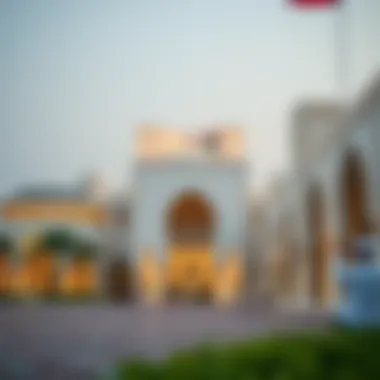Ramadan 2024 in UAE: Cultural and Real Estate Insights


Intro
Ramadan is more than just a month of fasting for Muslims; it is a significant cultural phenomenon that shapes social interactions, economic activities, and the very essence of community life in the United Arab Emirates. As 2024 ushers in this holy month, the UAE, particularly Dubai, braces itself for an array of transformative changes that span the realms of culture and real estate. Understanding these changes is crucial for investors, buyers, and sellers alike, as the dynamics during Ramadan can greatly influence decisions in the property market.
As people come together for Iftar, the breaking of the fast, the atmosphere becomes electric with conviviality. Streets are adorned with colorful lights, and traditional markets bustle with activity, showcasing an array of local foods and crafts. However, beyond the festive spirit lies the potential impact on the economic activities, especially in the real estate sector. How Ramadan intertwines with property dealings can spell opportunity or caution for market participants.
In this article, we will delve into how the cultural practices of Ramadan manifest themselves in the UAE, while also offering insights into the current property market landscape. We will explore buying and selling guidelines specifically tailored for this period, providing a comprehensive guide for those looking to navigate through this unique blend of spirituality and commerce.
The journey begins with an overview of the current state of the property market.
Understanding Ramadan
Understanding Ramadan is pivotal when diving into the cultural and economic landscape of the UAE in 2024. The significance of this holy month extends beyond mere fasting; it encapsulates the essence of community, faith, and resilience among individuals and families. For investors and stakeholders, grasping the nuances of Ramadan can inform better decision-making, especially within the real estate sector.
Religious Significance of Ramadan
At its core, Ramadan is a month of reflection, devotion, and spiritual growth for Muslims around the globe. This period commemorates the moment when the Quran was first revealed to the Prophet Muhammad. Fasting from dawn until sunset is a vital part of Ramadan, known as Sawm. During this time, believers abstain from food and drink—a practice aimed not just at self-discipline but at fostering empathy for the less fortunate.
Fasting is complemented by increased prayer, reading of the Quran, and engaging in charitable acts. The importance of these rituals can’t be overstated—serving as a reminder of the strong ties to one's community and a call to uplift those in need. The act of breaking the fast, known as Iftar, is often a communal event, where families and friends gather, further solidifying bonds amidst the collective experience of worship.
Fasting is not simply about abstaining; it's a holistic approach to living that encompasses mind, body, and spirit. Observing Ramadan instills a deeper connection with God, a renewed sense of purpose, and a commitment to positive change.
Historical Context in the UAE
The UAE’s unique cultural identity during Ramadan is steeped in rich historical significance. Traditionally, the region has been a melting pot of cultures, with its own specific customs around the holy month. Ramadan has been observed in the Emirates since the inception of Islam in the region. Over the years, the rituals obtained a local flavor, reflecting the values and traditions of Emirati society.
In ancient times, Ramadan was observed with the same reverence, yet aspects such as communal feasting were deeply rooted in tribal customs. Families would often prepare vast quantities of food to share with neighbors and those in need. This practice continues today, linking modern UAE to its historical past—a reminder of the community spirit that has prevailed.
As the UAE developed into a modern nation, the approach to Ramadan evolved. However, the essence remained intact. The festive atmosphere is amplified by public events, charity drives, and cultural exhibitions that reflect both historical traditions and contemporary practices. Government officials, businesses, and community leaders work collaboratively to ensure that Ramadan upholds its significance while embracing modernity.
Ramadan Practices in the UAE
Ramadan is not merely a month of fasting; it’s a profound cultural experience that shapes the social and economic landscape of the United Arab Emirates. During this sacred month, the rhythms of daily life change significantly, reflecting the values of community, charity, and reflection. The practices observed during Ramadan hold considerable significance, especially for investors and real estate professionals looking to navigate this unique time effectively. Understanding these practices can lead to informed decisions that align with the local customs and business environment.
Fasting Rituals and Observances
Fasting, or sawm, is one of the Five Pillars of Islam and serves as the cornerstone of Ramadan observances. From dawn until sunset, Muslims refrain from food and drink, which serves not only as an act of worship but also as a means of developing self-discipline and empathy for those less fortunate. In the UAE, this practice is deeply respected and observed with serious commitment.
The rituals surrounding fasting vary slightly from family to family, yet common elements persist. Traditionally, the day begins with suhoor, the pre-dawn meal, which is critical for sustaining energy throughout the day. Many families opt for wholesome foods rich in nutrients, ensuring they maintain energy until iftar, the meal that breaks the fast. Interesting to note, some people may engage in personal routines, such as reading the Quran during the day or attending special prayer gatherings.
This deep commitment to sawm reflects a societal norm that encourages community spirit. As a result, businesses adapt their hours to accommodate the fasting ritual, often closing early to allow employees to rest and prepare for iftar. This shift can influence the local economy as shopping centers adjust their opening hours and restaurant services begin later in the day.
Iftar Traditions and Gatherings
The iftar meal is more than just a time to eat; it represents togetherness and gratitude. Families, friends, and even strangers gather to break their fasts over shared meals. This aspect transforms homes into vibrant spaces filled with laughter and conversation as plates overflow with dates, juices, and traditional dishes.
In the UAE, many restaurants offer iftar buffets that feature a variety of local and international cuisines. Some popular diched include harees (a wheat and meat dish), fatayer (savory pastries), and rich desserts like kunafa. These establishments see a surge in business during Ramadan, providing good opportunities for real estate investments, especially in areas where dining and cultural experiences flourish.
Furthermore, some mosques open their doors to the public, providing free iftar meals to encourage a sense of unity among communities, regardless of backgrounds. This tradition not only highlights the hospitality in Emirati culture but can also catalyze significant foot traffic, thus benefiting retail spaces nearby.


In essence, the iftar gatherings serve as a prime example of communal spirit, where resource sharing contributes to a deep sense of belonging, thus making it essential for investors to consider community-focused attributes when developing real estate projects.
Social Activities during Ramadan
During Ramadan, there is an increase in social activities that reflect the spirit of generosity and community bonding. These activities vary widely, from nightly prayers known as Tarawih, held at mosques, to charitable initiatives aimed at helping those in need. The month is a time when generosity flows freely, with many congregations coming together to support various causes.
Organized charity events and community outreach are rampant. Businesses often engage in donations, and many individuals take the opportunity to volunteer their time and resources. This raises visibility for local charities and can lead to connections between investors and community stakeholders that might influence future real estate development. Understanding these dynamics can help property developers align their projects with local initiatives, enhancing their reputation and fostering goodwill among potential buyers.
As the sun sets, cultural experiences abound, such as street festivals and public gatherings showcasing Emirati traditions, music, and art. These events create buzz and attract visitors, which can positively affect the local economy.
In summary, the practices during Ramadan in the UAE encapsulate a unique blend of spiritual observance, community engagement, and economic activity. Recognizing these nuances not only enriches understanding but also empowers investors and stakeholders in the real estate sector to tailor their strategies effectively.
Insightful Note: Understanding Ramadan's cultural practices allows investors to make decisions that resonate with local community values, fostering stronger ties and potentially improving business outcomes.
By grasping the significance of these Ramadan practices, investors can better navigate the unique landscape that the UAE has to offer during this vibrant period.
Economic Impact of Ramadan
Understanding the economic impact of Ramadan in the UAE is crucial for comprehending how this sacred month influences various sectors, particularly real estate. During this time, businesses experience a shift in consumer behavior that differs significantly from the rest of the year. From altered spending patterns to increased demand in specific markets, Ramadan offers unique opportunities and challenges for investors and stakeholders.
Retail and Hospitality Sector
Ramadan brings about a noticeable uptick in retail and hospitality activities within the UAE. Many consumers engage in pre-Ramadan shopping sprees to stock up on food, clothes, and gifts for family gatherings. This surge in retail sales leads to significant revenue increases for businesses, translating into a more prosperous shopping experience and heightened foot traffic at malls and markets.
The hospitality sector also sees a remarkable boost. Many hotels, particularly those in Dubai, devise special Iftar and Suhoor packages to attract both locals and tourists. Dining establishments bustles, and it becomes common to see bustling Iftar buffets at various venues. This spike contributes to employment opportunities as businesses hire extra staff to cater to increased demand.
To maximize engagement, retailers often adopt specific marketing strategies that resonate with the consumer’s sentiments during Ramadan. For instance, discounts and promotions tied to charitable acts often appeal to shoppers’ values, creating a win-win situation for both consumer and retailer. However, it is worth noting that some businesses remain cautious, as potential restrictions on operating hours may influence their decision-making.
In summary, the retail and hospitality markets experience dynamic shifts during Ramadan, presenting lucrative opportunities for those looking to invest or expand in the UAE.
Investment Trends during Ramadan
Investment behaviors also witness variations during Ramadan. Many investors view this month as a period of reflection and strategic planning. With various investment opportunities arising, particularly in the real estate sector, there is usually a strong inclination towards evaluating potential properties for both personal use and rental investments.
During this month, property developers often unveil special projects with payment plans designed to align with consumer cash flow during Ramadan, making it more feasible for investors to commit. This strategic timing ensures that new launches capture attention while consumers are in a spending mindset.
Moreover, social events and networking opportunities proliferate during Ramadan. Real estate agents and developers often find informal gatherings to be productive spaces to discuss business opportunities, identify potential partners, and engage with prospective buyers or investors.
In contrast, some sub-segments, like luxury real estate, might experience slower activity as consumers prioritize family gatherings over housing purchases.
"Ramadan serves as a crucial litmus test for gauging consumer confidence and economic sentiment in the UAE. Investors respond by reassessing their strategies according to changing environments."
Overall, the economic implications of Ramadan extend far beyond traditional observances. The blend of cultural practices and market opportunities creates a fertile ground for growth and investment, allowing for tailored strategies in navigating the unique rhythms of this holy month.
Cultural Events and Festivities
When one thinks of Ramadan in the UAE, the rich tapestry of cultural events and festivities emerges as a hallmark of this sacred month. These events are not just for observance; they play a crucial role in community bonding and economic interactions. They reflect the essence of living in a multicultural society, showcasing a mosaic of traditions and beliefs that flourishes within the UAE. This section will dive into the community gatherings and art exhibitions that arise during Ramadan and their broader implications.
Community Gatherings and Charity
Community gatherings during Ramadan foster a sense of togetherness and shared purpose among residents. Whether it's in bustling mosques or lively neighborhood parks, these gatherings are central to enhancing social cohesion. Families often come together for iftar meals, breaking fasts with delicious foods that vary greatly across cultures, from Emirati dishes to those from South Asia and beyond.


The spirit of giving is at the heart of Ramadan. Community gatherings often coincide with charitable initiatives, allowing individuals to extend their generosity to those in need. This not only benefits recipients but enriches the giver’s experience, firmly rooting the values of compassion and community.
In the UAE, gatherings typically include charity events, cultural performances, and workshops aimed at promoting understanding and tolerance among diverse communities. Many organizations, such as the Red Crescent, come forward to arrange food drives, health check-ups, and donations for less privileged families. This intersection of celebration and compassion underscores the unique social fabric of the UAE, where residents can connect deeply, regardless of their backgrounds.
Art and Cultural Exhibitions
Art and cultural exhibitions during Ramadan add a vibrant layer to the observance of this holy month. Various galleries and cultural institutions, including the Louvre Abu Dhabi or Sharjah Art Foundation, host exhibitions that reflect themes of spirituality and humanity, urging attendees to ponder profound questions about life and faith.
These exhibitions often feature local artists and their works, ranging from contemporary interpretations of traditional Islamic art to innovative multi-medium installations. They serve as a platform for dialogue and showcase the artistic prowess emerging from this unique region.
Additionally, many of these events offer workshops and interactive sessions, promoting inclusivity and inviting everyone to participate. This opens the door for investors and developers to explore opportunities in contemporary spaces that blend art and commerce, tapping into the growing cultural tourism market.
In summary, the cultural events and festivities during Ramadan embody more than mere celebration; they are essential in promoting harmony and neighborly support, all while laying the groundwork for potential investment ventures in the burgeoning cultural sectors of the UAE.
Real Estate Market Dynamics during Ramadan
The holy month of Ramadan brings about unique changes and dynamics in the real estate market of the UAE. This period is not just defined by spiritual reflection but also holds significant implications for property investors, buyers, and sellers alike. Understanding the real estate market dynamics during Ramadan is crucial for anyone looking to navigate opportunities and make informed decisions in this richly diverse environment. While spirituality and community take center stage, the real estate sector experiences some notable fluctuations that can impact investments and property values.
Shifts in Buyer Behavior
During Ramadan, one can observe a marked shift in buyer behavior. Many potential homebuyers show a tendency to slow down their purchasing decision. Buyers often prioritize family gatherings and community obligations over property hunting. The result? A noticeable dip in foot traffic at open houses and a gradual decrease in property showings. Yet, this lull can present golden opportunities for savvy investors.
- Cultural Awareness: The significance of Ramadan often means buyers are more inclined to consider properties that foster family and community participation—think larger homes or apartments with community amenities.
- Focused Searches: While some buyers may pause their search, others become more intentional with their property listings. Buyers often seek homes close to community centers or mosques, illustrating a focus on convenience during the holy month.
- Increased Negotiation Power: The sluggish activity might give buyers more leverage in negotiations, leading to favorable deals for serious purchasers.
“The key to understanding market shifts during Ramadan is recognizing the cultural influences that shape buyer intentions.”
Property Demand Fluctuations
As the month unfolds, property demand experiences its own set of fluctuations. The dynamics aren't just driven by buyer intent but by various cultural practices associated with Ramadan. Recognizing these trends can offer unique advantages:
- Investment Hot Spots: Certain areas tend to see spikes in demand due to Ramadan-related activities, like Community Iftar events. Investors can find potential in properties located near these hubs.
- Short-term Rentals: During Ramadan, there’s typically a rise in short-term rentals as expatriates and locals host family and friends for the iftar meal or community events. Properties that can be easily converted to accommodate guests can be lucrative investments.
- Post-Ramadan Boom: Historically, the end of Ramadan sees a burst of activity as buyers and investors transition back to their property pursuits. The pent-up demand can lead to increased transactions, making it an optimal time for sellers to list their properties.
To make more informed decisions, keep an eye on local resources such as Dubai Land Department or community forums on Reddit to remain updated on trends and shifts.
Investment Opportunities in Ramadan
The holy month of Ramadan is not just a time for reflection and spiritual growth; it also represents a unique avenue for real estate investment within the UAE. It’s a period when many individuals and families assess their living situations, leading to shifts in property demands and preferences. Those looking at real estate must recognize and understand the nuances that Ramadan brings to the market.
Why is this significant? During Ramadan, the dynamics of buyer and renter behavior change. Investment opportunities can emerge from these altered consumer patterns. As people focus on family gatherings and communal activities, locations that offer easy access to cultural and social amenities can become hot zones for buyers and renters alike. This is where astute investors can find favorable conditions for entering the market or expanding their portfolios.
Identifying Prime Properties
Identifying properties that appeal to the market during Ramadan involves careful consideration of various factors. Buyers tend to look for locations that not only cater to their personal needs but also reflect the spirit of the season.
- Accessibility to Mosques: Properties near mosques often see a surge in interest since families prioritize proximity for daily prayers and special Ramadan events.
- Community Spaces: Neighborhoods with parks or communal gathering spots facilitate celebrations and gatherings during Iftar, making them more desirable during Ramadan.
- Family-Friendly Amenities: Properties with several bedrooms or amenities such as playgrounds tend to attract families looking to accommodate relatives who may visit during the month.
These characteristics can appeal to buyers seeking a meaningful environment that enhances their Ramadan experience, creating a ripe opportunity for investors who can align their offers with community preferences.
Benefits of Investing During Ramadan


The advantages of making real estate investments during Ramadan may not be immediately apparent, but they can be quite substantial.
- Increased Activity: Many potential buyers are often more motivated during Ramadan due to its spiritual significance. This can lead to quicker decisions and less negotiation time as families aim to settle before Eid.
- Potential for Deals: Some owners might be willing to sell properties at more favorable terms during this period, particularly if they are looking to move before the Eid celebrations.
- Investment in Community: During Ramadan, many investors find that they are able to connect more deeply with the community. This relationship can enhance credibility for their investments, benefiting not just individual investors but the local economy as a whole.
- Less Competition: Given that some people may hesitate to engage in transactions during the holy month, investors may face less competition, allowing for more advantageous positioning in negotiations.
"Investing during Ramadan can be akin to catching the wave before it swells—timing, location, and understanding cultural significance play a crucial role in capitalizing on opportunities."
Navigating the real estate landscape during Ramadan requires attention and a keen understanding of both the market data and community sentiment. Investors and stakeholders who recognize and adapt to the shifts in buyer behavior can gain significant advantages that may ripple beyond this holy season into long-term success.
For additional insights on real estate trends during Ramadan, the following resources may be beneficial:
Understanding the intersection of Ramadan and real estate opens doors to informed decision-making, propelling investors toward more effective strategies as they navigate this unique market landscape.
Future Trends: Ramadan and Real Estate
Understanding the future trends surrounding Ramadan’s influence on real estate in the UAE offers pivotal insights for investors and stakeholders alike. As the holy month approaches, there’s a shift in not only social dynamics but also in market behaviors. Recognizing these trends can help real estate professionals align their strategies to capture opportunities and mitigate risks.
Long-term Effects on Real Estate Investments
The impact of Ramadan on real estate extends far beyond the month itself. Traditionally, properties may see a surge in interest post-Ramadan as celebratory moods often translate into increased buying activity. During Ramadan 2024, it is anticipated that investors may become particularly keen on rental properties, driven by the influx of visitors looking to experience the season in the UAE.
"The trends set during Ramadan often ripple through the rest of the year, shaping investment strategies and property values long after the last date of fasting has passed.”
Homes and commercial properties in proximity to mosques or iftar hubs may rise significantly in demand, as families and tourists gravitate towards locations that resonate with their cultural practices. This leads to potential price hikes or increased rental rates in desirable areas. Investors must note that the success of a property during Ramadan often correlates with its alignment to community values and accessibility to cultural events.
In the long run, properties that successfully cater to the local customs may become more than just buildings. They can evolve into community hubs that substantiate lasting value.
Predictions for Ramadan in Upcoming Years
Looking ahead, we can predict some interesting trends that could reshape the real estate market even further. With the scientific and technological advancements making waves, virtual reality tours of homes could become commonplace by the time we reach Ramadan in 2025. Prospective buyers might be able to browse through properties remotely, bringing international investors closer to the UAE market than ever before.
Furthermore, there’s a growing trend of sustainable living that will likely gain momentum during Ramadan. As people become more environmentally conscious, properties emphasizing green technologies and sustainable living may attract more attention.
- Emerging Markets: We can expect a gradual rise in luxury rentals catering to conscious travelers who wish to indulge in the Ramadan experience while ensuring their carbon footprint remains minimal.
- Community Projects: Initiatives that foster community engagement during Ramadan may become integral in property development plans, as investors seek to create spaces that foster interaction and enrich the local fabric.
In summary, aligning with these future trends not only positions real estate professionals for success but also contributes to a vibrant community that flourishes during Ramadan and beyond. Engaging meaningfully with market shifts can prepare investors to take proactive steps, safeguarding their assets, and maximizing their returns during this culturally rich time.
Closure
As Ramadan unfolds in the UAE, its far-reaching effects extend beyond the spiritual realms and spill into economic sectors, notably real estate. This segment aims to encapsulate key insights related to Ramadan’s cultural context and its pronounced implications for property investors, stakeholders, and other market participants.
First, this period is marked by a unique blend of cultural practices that foster community spirit, and this aspect is vital for anyone seeking to engage dynamics within local markets. Understanding these traditions helps pinpoint customer sentiment and buyer behavior, which tend to shift significantly during Ramadan. The special atmosphere can bring about temporary changes in the market, as traditional Iftar gatherings encourage communal dining, potentially sparking interest in properties that facilitate such experiences.
Moreover, the insights gathered from this analysis suggest that Ramadan serves as a distinct period for investment strategies. Investors often find that discerning the cultural nuances can provide a competitive edge when identifying prime opportunities. Additionally, the careful consideration of community needs during this period can signal to stakeholders where to direct their focus—be it in retail, hospitality, or residential sectors.
The significance of Ramadan in the UAE doesn’t just reside within the act of fasting; it permeates the very fabric of societal interactions and economic transactions.
In summary, recognizing these cultural sentiments and consumer behaviors during Ramadan influences various investment strategies and market engagements. Failure to appreciate the intersections between Ramadan traditions and real estate dynamics could mean missing the boat in a highly competitive market. Therefore, investors and stakeholders who leverage these insights can navigate waves of opportunities, making informed decisions that align with the community's values.
Summary of Insights
Understanding the cultural practices during Ramadan reveals pivotal trends that shape buyer and investor behavior. The season prompts an uptick in social gatherings and a keen interest in communal spaces, influencing preferences in property features and locations. Moreover, the emphasis on charitable acts during this time encourages a sense of community involvement that can impact local economies.
Implications for Investors and Stakeholders
With insights drawn from the cultural fabric of Ramadan, property investors can tailor their strategies more effectively. Recognizing the heightened emphasis on community during this month, stakeholders might consider focusing on developments that foster social interactions or incorporate spaces for family gatherings. Additionally, it is prudent to monitor market shifts closely since Ramadan can lead to temporary demand fluctuations that savvy investors can capitalize on for long-term gains.











